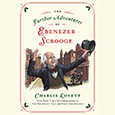More in Heaven and Earth
In The Deepest Human Life, Scott Samuelson conveys an infectious sense of wonder
For a survey of philosophical thought, Scott Samuelson’s quirky, abundantly informed new book, The Deepest Human Life, is a surprisingly snappy read. A cynical elevator pitch might call it “philosophy for dummies,” but it’s not for dummies any more than it’s for overly serious chin-massagers. The book would be useful as either an introduction or a brush-up, and enjoyably personable in either instance.
The Deepest Human Life manages to be funny and self-deprecating: “I was filled with intellectual puzzlements,” Samuelson writes, while describing a scene in which his ten-year-old self attempts to practice kissing by making out with a pillow. It also manages to be graceful and concise: “I think it would be humane to live by the following two principles: when truth and God seem to differ, go with truth; when truth and love seem to differ, go with love.”
Samuelson also does a good job of contextualizing our own historical moment and the way it shapes our thoughts:
In an age where spiritual things are the central focus of society, health care is left to quacks, and the great debate concerns how money should play a role in the religious life (simony, by the way, is the sin of paying money for spiritual things; it was a major concern of the Middle Ages); whereas in our age, the situation is reversed: the spiritual life is mostly left to quacks, and we debate if people have a right to health care.
From Socrates to Kant, Pascal to Arendt, the book covers a lot of ground in a relatively short amount of space, but it never lacks energy or an infectious sense of wonder.
That said, The Deepest Human Life is subtitled An Introduction to Philosophy for Everyone, and while that’s an admirable goal undertaken admirably, the book isn’t necessarily for everyone. For instance, Socrates’s famous dictum, “I know I know nothing,” is an oft-recurring theme, and readers who insist on hard answers will find this book frustratingly short of them. Similarly, hardcore atheists might have a rough go of it, as there is a lot of discussion of God, much of it invested in trying to square His—male, and with a capital H—essential goodness and power, or some combination of the two, with our messed-up world and all its depravity. Serious philosophy students (self-serious students especially) might bristle at how quickly Samuelson moves through topics: materialism and dualism, as they concern the soul, get about two pages; Descartes’ fifth meditation gets a single sentence. Deconstructionists may experience heart palpitations.
 But as with philosophy itself, the book’s faults, if you consider them faults, can also be its charms. While there’s no strict structure to the book—some chapters are more thematic, others focus on a single philosopher, still others are interludes involving personal stories—the looseness helps keep the discussion moving. There are wild shifts in tone (juxtaposing Socrates’ musings with Bob Dylan lyrics, for example), though this is probably an effect of Samuelson’s experience as a teacher: as a professor of philosophy and the humanities at Kirkwood Community College in Iowa City, he is surely adept at keeping students just off-guard enough to keep them awake. And while the sometimes informal tone can verge on corniness, the book includes well-articulated and sustained discussions, as well.
But as with philosophy itself, the book’s faults, if you consider them faults, can also be its charms. While there’s no strict structure to the book—some chapters are more thematic, others focus on a single philosopher, still others are interludes involving personal stories—the looseness helps keep the discussion moving. There are wild shifts in tone (juxtaposing Socrates’ musings with Bob Dylan lyrics, for example), though this is probably an effect of Samuelson’s experience as a teacher: as a professor of philosophy and the humanities at Kirkwood Community College in Iowa City, he is surely adept at keeping students just off-guard enough to keep them awake. And while the sometimes informal tone can verge on corniness, the book includes well-articulated and sustained discussions, as well.
The chapter titled “The Ecstasy Without a Name” is a good example of Samuelson at his best, and where his skill at conversation and his erudition intertwine. It opens with a discussion of believing in Santa, includes an anecdote from a student—the book contains many anecdotes from students, illustrative and occasionally poignant—who blackened the eye of the kid who disabused him of that belief, and goes on to discuss the writings of Abu Hamid al-Ghazali, who was a famed teacher but gave up his standing after reaching an epistemological crisis. Then Samuelson weaves lines from Blake, Donne, Tennyson, and Eliot into the discussion in ways that illuminate and deepen the discussion.
At its best, The Deepest Human Life takes serious questions seriously without taking itself overly so: “It is more civilized to make fun of life than to bewail it,” Samuelson points out, quoting Seneca. And of course it’s easier to lighten up if you know you don’t know anything, but Samuelson knows a lot, and he presents his knowledge in a way that’s considered and approachable.

Steve Haruch lives in Nashville. He has written about culture and music for NPR’s Code Switch, The New York Times, and the Nashville Scene, where is he is a contributing editor.


